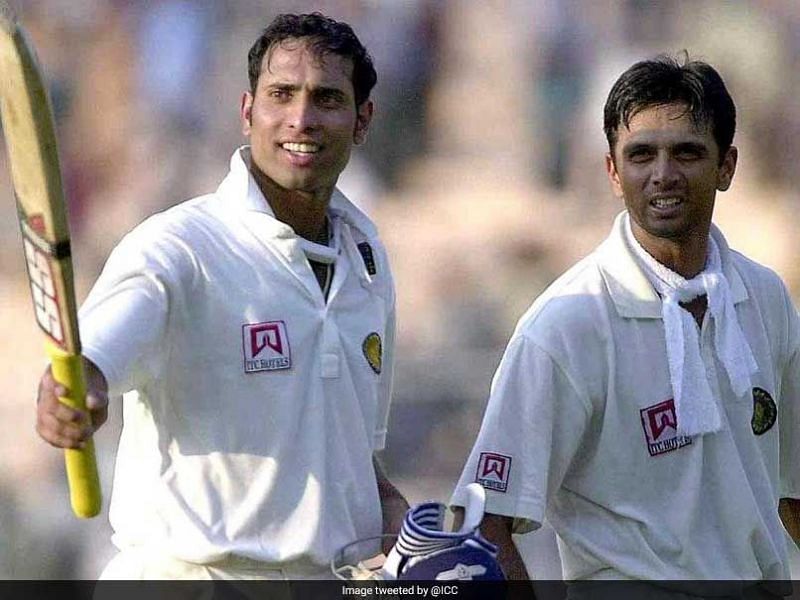
Memories Of Adelaide: A Dravid and Laxman Encore
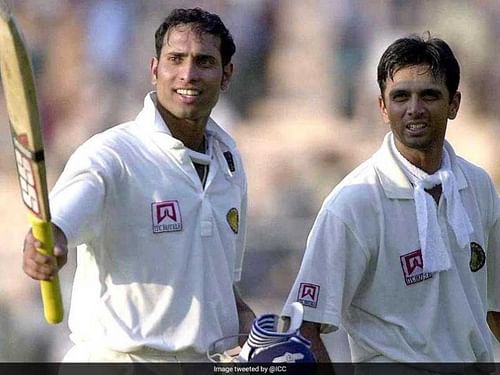
Whenever the names of Rahul Dravid and VVS Laxman are taken in conjunction, it conjures up the image of two men clad in test whites with handkerchiefs around their necks batting for an entire day against mighty Australia in the sultry heat of Kolkata. Their partnership that day, when thought about in retrospect, seems almost mythical, something that, if told as a story would sound like fiction. Two batsmen - one was recovering from a viral fever, the other battling back spasms, staring arguably the best team of any generation right in the eyes and refusing to back down.
They didn't just bat out the day; they dictated the day to the Aussies. They didn't just defy them; they bullied them as Dravid and Laxman put their heads down and went to work on each session a new cricketing superpower was born. India was doing something special, and the entire world knew it.
The sight of it was unprecedented. It was like Neil Armstrong and Buzz Aldrin setting foot on the moon - no one believed it could be done until they did it.
It's not every day that a team that had won sixteen Test matches on the trot loses after enforcing the follow-on. It's not every day that a bowling attack comprising of McGrath, Warne, Gillespie, and Kasprowicz fails to pick up a single wicket in ninety overs.
The Kolkata Test of 2001 would go down as one of the greatest of all time, and Rahul Dravid and VVS Laxman would find their names safely engraved in the annals of cricketing lore.
But there was another round to go
For many, the Kolkata Test was the epitome of a miracle, and it indeed was, giving two of the most underrated players of their generation their most beautiful moment in the sun. Though, for those romantics of the game who find an exhilaration in geeking over the lesser talked about feats of cricketing excellence, what Dravid and Laxman achieved in Adelaide about three years later was in no way less significant than their legendary stand at The Eden.
When India landed in Australia at the end of 2003, they were a much-improved side than the one that had gone there in 1999/2000. It was a determined team that had the advantage of having, perhaps, the most decorated middle order in the history of the game, and yet they were the overwhelming underdogs. No team comes to Australia as the favorites. It's a tough country to tour, and the challenge becomes exponentially tougher when the Aussies are already hurting.
Also see – Women’s cricket world cup schedule
The events of 2001 were still fresh in the Australian minds. Steve Waugh had called India "The Final Frontier," the last pit stop on their path to become the greatest side ever, and having failed to conquer it he would have been itching to beat the men who had defended that frontier this time at home and beat them comprehensively.
The Indians though had other plans.
The series began in Brisbane and SouravGanguly's gritty 144 helped India secure a draw. But for the Aussies, it was perhaps as demoralizing as a defeat. When was the last time they had failed to be victorious in the first Test of a home series against a sub-continental side? The match and the result reiterated the belief that if there was one side in the world capable of giving the Aussies a run for their money in their backyard, it was India.
But as the second Test began in Adelaide, coinciding perfectly with the winter holidays back home, that notion looked more like an obstinate fantasy than a fact.
Australia piled up a mammoth 556 in the first innings, and by the end of the second day's play had reduced India to 180 - 4 with Virender Sehwag, Sachin Tendulkar and Ganguly all back in the pavilion. The writing was on the wall. Another overseas Test loss was lurking overhead, or was it?
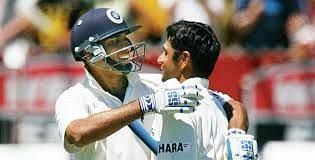
Because the two not out batsmen were VVS Laxman and Rahul Dravid- the orchestrators of that magical Eden symphony of three years prior.
The nation went to bed that night, telling itself that there was still hope.
Watching a test match being played in Australia is always an arduous task for an Indian back home. Thanks to the countries being on opposite ends of the equator, the matches begin early in the morning, and to make matters more difficult, India invariably tours down under during the Australian summer, which, again, thanks to the different hemispheres, are the winter months in India. Getting up at 4 AM in the cold to watch a slow burn contest between bat and ball is something that might not appeal too much to the casual viewer. Still, for the die-hard enthusiast the inconvenience of time zones can never get in the way of relishing a good day's test cricket, and day three of the Adelaide test was not only enjoyable but a brilliant day of test cricket.
The magical third day.
The first hour of play was quintessential Test match cricket - slow steady and attritional with just the right amount of aggression thrown in. The bowlers bowled well, but the batsmen batted better. The defenses were solid, the leaves reassuring, and the strokes calculated. The Australians were searching for answers, and when they did get one with Laxman edging Andy Bichel to Ponting at second slip, the catch was floored.
The Indian dressing room heaved a sigh of relief.
Then the shots slowly began to come. Laxman cut one through point. Then Dravid whipped a Stuart McGill full toss to mid-wicket. Then Laxman drove another through the cover. The morning had indeed begun well.
India went to lunch at 252-4. Not a single wicket was lost in the session and the memories of Kolkata were slowly becoming prominent on collective minds. The partnership stood at 167. Dravid and Laxman were at it again.
The strokes began to flow more freely post-lunch. The cover drives, the square cuts, the flicks through mid-wicket; there were shots all around the ground and Australia were being made to chase the leather by two batsmen who loved tormenting them together.
But the most memorable shot of the day or, for that matter, the entire match came when Dravid hooked Jason Gillespie for a six to reach his hundred. Some argued that it was a top edge and Dravid was lucky not to be out caught but the fact was that it was a proper calculated hook shot. Uncharacteristic of Dravid but a sight to savour nonetheless.
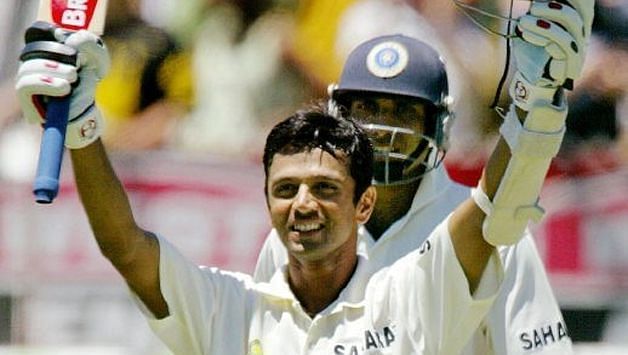
Dravid, however, was not done yet and neither was Laxman. The runs continued to flow and soon there was another centurion on the board.
It was a déjà vu that the Australians had perhaps hoped they would never have.
To watch them bat that day was a lesson in itself. Sport, with all its unpredictability, camaraderie, heartbreaks and joys, can often be a great metaphor for life. What happens on the field can so often vividly reflect our own experiences, and every once in a while there comes a moment in sport that carries with it a wisdom for life.
Dravid and Laxman's partnership that day was one such moment.
They taught one to never give up even if cornered in enemy territory and to take the blows with grit and then return them with aggression. It was a tuition of resilience, of confidence and determination, and it proved why sports could be as much about enlightenment as entertainment.
The Australians too were getting an enlightenment of their own. The reconfirmation of the knowledge that this Indian side of the new millennia would not back down into a corner.
The runs kept coming at a rapid clip as the second session went on. Square cuts, flicks, cover drives and even hits straight over the bowler's head; it was batsmanship at its highest class and for any greenhorn playing in local clubs. It was a masterclass and every second of it had to be absorbed.
Just at the stroke of tea the partnership reached three hundred - the second time these two had achieved the number against Australia - and immediately after Laxman edged one behind of Bichel to Gilchrist to fall for 148.
But most hearts weren't yet broken though. Dravid was still there. The wicket of Laxman didn't seem to have affected him as he continued in the company of Parthiv Patel and then AjitAgarkar and Anil Kumble to end the day not out on 199. India were 477 for 7 and the Australian first innings total was well within reach. What a day of test match cricket it was.
Dravid's double
Stuart McGill opened the bowling for Australia on the fourth morning and Dravid smacked the first ball past point for a four. 203 not out.
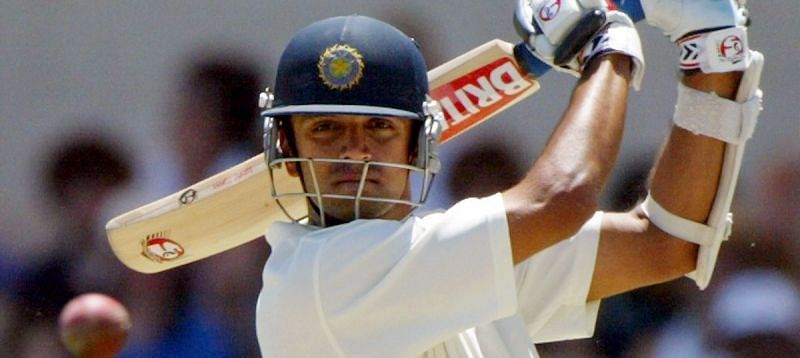
It seemed fitting. Dravid deserved a double three years back at The Eden. That was as stubborn a Dravid knock as any and he fell twenty short there. But fortune doesn't only favour the brave it also gives the resilient a second chance, and when it provided Dravid with his second chance he wasn't going to let it pass. It was a redemptive knock after the disastrous tour he had of Australia in 99/00, and if one looks back in retrospect, then it seems like redemption was the central running theme of Dravid's career. And though it didn't begin in Adelaide, that distinction perhaps goes to the 99 World Cup, it found its essence there in that Test match.
Dravid added another thirty runs to his score and took India to 523 - just 33 runs behind Australia's total - before mistiming a hook of Gillespie to be the last man out.
The Australian collapse
India's fightback it seemed had dented Australia's belief and they never got going in the second innings. Agarkar cracked open the top order with the wickets of Langer and Ponting and then came back to wipe off the tail as India bowled them out for 196 to set themselves a target of 230 for a historic win.
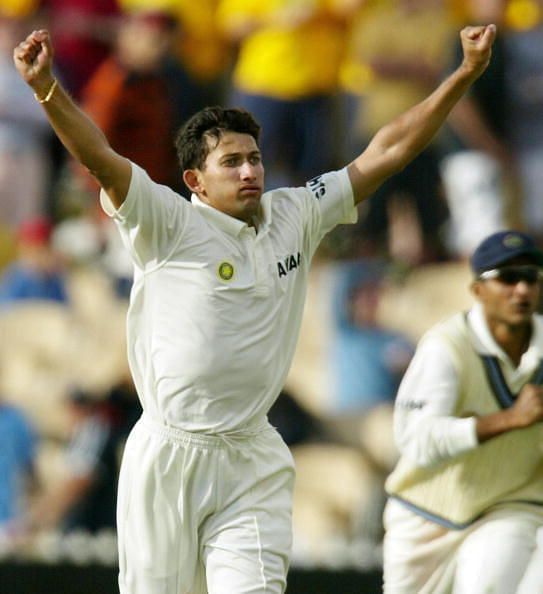
History made
India went to stumps at 37-0 and the general feeling going around, influenced no doubt by precedents that the chase will be an extremely tricky one. Australia wasn't known to concede series leads, and scoring 230 against them on a fifth day's wicket was going to be a difficult task.
But there was Dravid again.
He came to bat after Akash Chopra and Sehwag, much like they did in the 1st innings, gave India a solid start, and from thereon took the responsibility of the chase upon himself. It was another show of obstinate class. Dravid was determined not to let his and Laxman's efforts in the first innings and Agarkar's spell in the second go to waste. Tendulkar chipped in with a valuable thirty, and so did Laxman, who had to put a few more silken shots down Australia's throat, but it was Dravid who stood like the rock that he always was and scored another 72 to take the team home.
The image of him playing the cut of McGill to bring up the victory and then taking off the cap while jumping and kissing the Indian emblem in celebration would be etched in the memories of every Indian cricket fan who was fortunate enough to witness that moment. Sourav Ganguly later said that Dravid in that match played like God, and he couldn't have been more correct. It was a performance deserving to be revered for perpetuity, an exhibition of class, and a tutorial of perseverance.
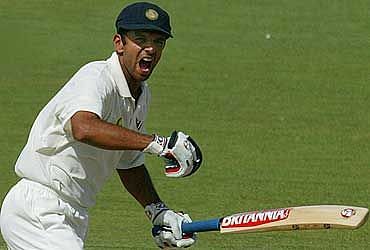
Yes, the Eden Test of 2001 would perhaps be considered more iconic just for the sheer fact of that victory coming from a follow-on or because more people witnessed it with the match having being played in India.
Yes, the Australian attack in Adelaide did not have people like McGrath or Warne, but any Australian attack on their own surface is a potent attack, and the absence of McGrath and Warne takes nothing away from the brilliance of Dravid and Laxman.
Where most batsmen would have been more than happy with just one career-defining inning and partnership against the Australian side of the 2000s, Dravid and Laxman had two in three years and just for suitable measures the second one was in Australia's den.
It was an encore that was as spectacular as its precursor.